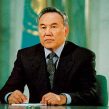
KAZAKHSTAN PREPARED TO USE FORCE AGAINST “REVOLUTIONARIES”
Publication: Eurasia Daily Monitor Volume: 2 Issue: 129
By:

The authorities in Kazakhstan, reacting carefully and deliberately, are preparing security agencies to use force in the event of revolutionary activity similar to events in Ukraine and Kyrgyzstan. It is predictable that the regime of President Nursultan Nazarbayev should choose to flex its muscles in order to reduce the risk of internal disorder. Yet the level of openness concerning measures currently underway to enhance the readiness and firepower of Interior Ministry forces conveys mixed signals to Kazakhstan’s Western security donors. While progressing towards improved military structures capable of rapid deployment and combat operations against terrorists, there are signs that Astana would not hesitate to quell any movement of its citizens involving political unrest. These signs involve a worrisome movement of military hardware from military to police control.
Kazakhstan Interior Minister Zautbek Turisbekov believes that the political justification for such measures lies in the success of the revolutions in Georgia and Ukraine, which Kazakhstan wants to avoid repeating. Indeed, fears raised over the unrest in Uzbekistan, as well as elsewhere in Central Asia, serve to focus thoughts among the Kazakhstani ruling elite because the prospect of popular unrest within Kazakhstan could unleash unpredictable consequences and damage the regime. Responding to government requests that more military weaponry and equipment be available to police units, the military has transferred 17,000 pistols, 2,500 automatic weapons, and 30 machine guns to the police. In fact, Turisbekov recently asked Prime Minister Daniyal Akhmetov to ensure the allocation of large numbers of items to the police, including light flack jackets (3,080), riot shields (2,080), riot helmets (2,880) rubber truncheons (1,450), special pistols (32), and stun grenades (840) (Nezavisimaya gazeta, June 28).
Such requests, rapid fulfillment of transfers, and promises of more weaponry suggest a serious effort is underway to increase the firepower and readiness of Interior Ministry units to respond with force against popular unrest. Kazakhstani security agencies are convinced that the success of the revolution in Ukraine emanated from the weakness of the intelligence and police structures to identify the organizers and active participants in the rally in Kyiv and act decisively to “neutralize” them. It is a lesson that Kazakhstan’s security forces want to learn from, relying on strength and force to maintain order and uphold Nazarbayev’s grip on power.
Kazakhstan continues to depend on Western security assistance to further its military reform program, making their armed forces more adaptable and combat ready. The United States has handed over 27 Humvee mobile vehicles worth $3.1 million. On July 1 U.S. Ambassador John Ordway attended a high-profile handover of the equipment with Kazakhstan’s Deputy Defense Minister Lt.-General Bolat Sembinov, which took place in Kapshagai (Almaty Region), where the Kazakhstani peacekeeping battalion (KAZBAT) headquarters is located. Ordway singled out Kazakhstan’s steadfast commitment to the global war on terror, allowing more than 3,000 coalition flights through Kazakhstani airspace since the start of Operation Enduring Freedom, and the continued political commitment entailed in the 27-man KAZBAT serving in Iraq. General Sembinov has since secured the rotation of the KAZBAT servicemen deployed in Iraq for another six-month tour of duty after widespread speculation that Kazakhstan might join the growing list of countries to withdraw its peacekeepers from Iraq. (Interfax, July 1, 4). The vehicles themselves will be used by the air-mobile troops and KAZBAT, ensuring a political return on the American investment.
As the Majilis (lower house of parliament) on June 29 finally agreed to adopt the law on reducing military service in Kazakhstan’s armed force to 12 months, there seemed tangible evidence that a gradual shift is occurring towards more professional forces. Deputy Defense Minister Abay Tasbulatov explained that such a reduction of military service periods “is put down to the change in principles of forming the armed forces, namely due to voluntary contract military service.”
President Nazarbayev has offered his own view of the operation in Andijan, Uzbekistan, that resulted in several hundred civilian casualties: “If armed people, including foreigners, seized a military unit, killed the guards, then seized a prison, and released 600 criminals, then captured weapons and seized government bodies — how should the state have acted in that situation? Israel never conducts any talks with terrorists in such a situation. Why do we talk differently in different circumstances?” (Interfax, June 30). In Nazarbayev’s view, the response of the Uzbek authorities was appropriate and nevertheless an internal matter. That calculation may take into account more than diplomatic deference to his near neighbor.
Thus, multifarious statements and hints from the political authorities in Kazakhstan suggest that a similar security response could be a serious option if faced with a revolutionary threat. Again the specter is raised of supplying equipment and training at the expense of the American taxpayer, ostensibly to boost regional security and give Kazakhstan more punch in the fight against terrorism. Keeping track of the equipment, its allocation, and the uses of U.S. military-to-military training will require careful monitoring. Kazakhstan has had a high dividend for its decision to deploy its small peacekeeping contingent to Iraq, largely financed through U.S. funding as well as deployed there utilizing American transport aircraft (Kazakhstan has no strategic airlift options). Its commitment to democracy — rather than merely holding the Nazarbayev family in power — appears much less credible, and this may yet be exposed as the weakness in U.S. foreign policy, with its twin objectives of promoting democracy around the world while attempting to maintain a shaky coalition in the war on terror.




